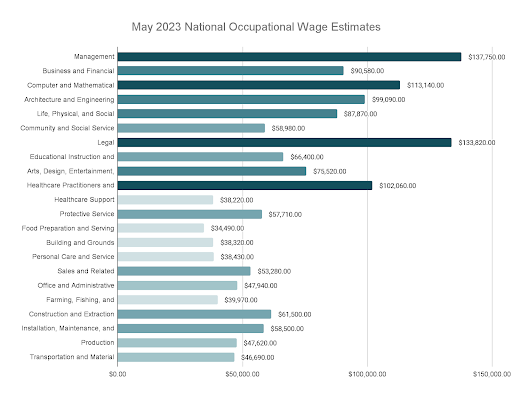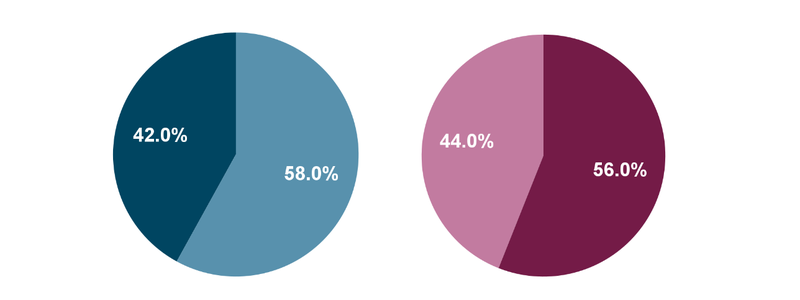In 2024, it feels like almost every other person is starting or has started a career in Information Technology. Why is it so popular? Does it mean that anyone can enter this career with ease? Well, the answers are yes and no. Yes, anyone can. And no, not with ease. Let’s take a closer look to figure out the reasons and analyze the opportunities.
IT has it all
Many are familiar with the IT sphere for its great perks, work-life balance, and high salary. And that’s true! We’ll discuss that later. But the most important reason people are so interested in working in the industry is the future of work.
Millions of people work in IT, and millions of new job openings are looking for new professionals to hire. Technology is everywhere, and someone has to support it and develop it further. The more we use different tools, gadgets, and programs, the more IT jobs are created.
In huge demand
In fact, more than 6 million people work in the information technology industry in the US alone. One third of them are engineers, quality assurance specialists, and other coding professions. The other two thirds are not-tech roles: project managers, operations managers, data scientists and much more.
It is projected that thousands of new IT jobs will be created in the next 2 to 3 years, with many stemming from the intriguing collaboration between IT and healthcare. Technologies are incredibly helpful, so in the near future, there will be more opportunities in hospitals for individuals who can operate the tools, not just care for the patients.
More than you think
IT professionals are often associated with technology services, but their expertise extends far beyond that. In today's digital age, IT professionals play crucial roles in virtually every industry, from healthcare and finance to education and entertainment. They are instrumental in developing innovative solutions, managing complex systems, and ensuring the seamless integration of technology across various sectors.
Moreover, in 20 to 30 years, it will be almost impossible to find a job without basic knowledge of AI and programming. It’s like you can’t work in an office without knowing how to operate a computer — it’s the norm.
IT is the fastest-growing industry. The statistics show that the number of computer and information technology occupations will grow by 44% by 2030. That’s about 377,500 new job openings per year.
- Millions of people work in IT, with 6 million people in US alone
- The industry is growing rapidly and will continue to do so in the next 20-30 years
- You don’t have to be tech to enter IT
Best benefits in the labor market
As we’ve already mentioned, people mostly know IT for its benefits. There are many of them and they can vary based on the role and the company. Still the number and the variety of them are impressive.
The highest salaries.
Nothing surprising here, everyone knows that programmers and testers earn much. But how much? According to the Bureau of Labor Statistics report, the median salary in the industry in March 2023 was $113,140. This is almost twice as high as the median for all occupations - $65,470.

There is career growth
There is no clearer career ladder than in IT. Working as a software engineer you can go from junior to lead and to the head of the department. If you don’t see yourself as a supervisor, you can choose horizontal growth - starting as a software engineer and then moving to quality assurance or cyber security.
Companies value their employees
A good IT specialist is a clear diamond. So, having one or more in a team means everything to employers and they implement more and more benefits and perks to keep their employees in the company. The most common are: remote or hybrid work, life and health insurance, flexible hours and corporate equipment. If they don’t want to offer remote work, then they do their maximum to make the office a comfortable place - resting rooms, free food, board games or game consoles.
A degree is not everything
Of course a degree may help you find a better place faster. However, not having one does not mean you can’t enter the field. There are plenty of courses with certifications which showcase you are competent. You can even study by yourself using free sources from the internet. You just have to be motivated enough.
- IT specialists earn almost twice the national average
- The career ladder in IT is one of the clearest
- On average, IT companies offer benefits like remote or hybrid work, flexible hours, corporate equipment, and much more
- There are no strict requirements for having a degree to enter the field
No unicorns and fluffy clouds
Although it may seem that everything's perfect, people often don’t realize that there is a dark side. Being an IT professional has its own drawbacks. Let’s look at them too to have an accurate vision of the field.
High level of competition
There is a huge demand for all the professionals in IT but employers are interested the most in people with relevant hands-on experience. So it becomes harder each year to start a career for the rookies. To succeed in this field being a newbie, you have to be patient and persistent. Pay attention to the small companies or start-ups instead of big corporations.
It’s stressful
No matter how much you are interested in what you’re doing, you’ll get tired sooner or later. And when it happens, a lot of IT specialists experience burnout. Not because they hate their work and need a change, but because IT is full of overworking and stress. According to Linkedin, 42% of IT workers experience burnout at some moment of their career. 56% can’t relax when they come home and keep thinking about work. There are dozens of deadlines and hundreds of bugs you have to improve - that is no easy task to manage mentally. So, when choosing to pursue this career - make sure you’re ready for this.

Self-discipline
Every profession requires you to constantly develop. However, IT is at a whole nother level. You’ll have to evolve your knowledge and competence to catch up with all the innovations in the industry that happen merely every day. To make yourself do it you have to be well-disciplined, highly motivated and able to keep your time management.
- IT is a highly competitive industry
- 42% of IT specialists report experiencing burnout at least once
- To succeed in the industry, you have to constantly develop to keep up with innovations
What’s the conclusion?
The IT industry is hugely attractive and has some pretty great benefits, so no wonder so many people see it as an opportunity to start a good stable career. There are some disadvantages though, which people tend to ignore or simply don’t think about. That’s probably because the pros mostly outshine the cons.
If you really think you want it, don’t hesitate and try it out! Ask your friends or family members if some of them have already started this career path. If not, check different forums on the topic - there are hundreds of people expressing the same doubts as you have. Create a draft plan and then start moving. You never know unless you try, right?
